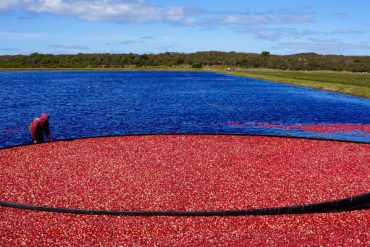Whether enjoying Sunday morning doughnuts at the counter of the Downyflake, or partaking in lobster and crab cakes at Topper’s, Nantucketers have long reveled in the honest pleasure of shared food and friendly company. Yet for most of the thousands of young men who sailed from Nantucket during the heyday of the whaling industry, mealtimes were not occasions to be enjoyed or anticipated. Instead of bringing the men together for a moment of kinship and a glimmer of regularity in a world so foreign, meals fractured the already tense relationships among the crew. Food was the source of disgust, unhappiness, and at times even violence.
R eading almost like a Weight Watchers meal plan from 150 years ago, a log book from the Three Brothers during a voyage from 1851 to 1854 details the honest truth of the crew’s diet: the food was uninspired, repetitive, and barely nutritious. The crew had “salt meat or codfish hash” for breakfast every day, and for dinner “duff [boiled or steamed pudding] & junk [salt beef].” Sugar and butter were reserved for the captain and officers; the crew denied even those small luxuries. The food seemed at best monotonously dull; nevertheless, the log keeper writes: “Take it upon the whole with a mean steward and a nasty dirty filthy cook we managed to get enough to eat.”
In addition to the horrible fare, the manner in which the men of the fo’c’sle took meals was often uncomfortable and humiliating. While the captain and officers dined at a table set with plates and silverware, the crew was forced to vie for a portion from a communal pot, often set out on the deck, using utensils the men had brought from home or purchased at exorbitant prices from the ship’s stores. One crew was not even allowed the time to enjoy (more likely gag down) their measly meal. The second mate of the Globe, on the voyage of 1820–22, perhaps drunk on the minimal authority he wielded over the crew, interrupted their meals and demanded their immediate return to work. And then there were the bugs—bugs of all kinds. Cockroaches roamed the fo’c’sle.
The men became food themselves when bedbugs bit through their sleeping clothes, and worms found their way into food barrels. The log keeper of the Mary, writing less than a year into their voyage, reported the bug-infested state of the flour and lamented, “…heaven only knows what will be there in 6 and 40 months.”
Is it any wonder that many of the men stepped forward to complain? And complain they did. There are well-documented voyages of two Nantucket whaleships on which major disasters occurred. In 1821, the Essex was struck and sunk by a whale, and the Globe— home to the aforementioned meal interrupter— was overtaken by mutineers in 1824. Prior to the disasters for which they are known, on both vessels the men complained about the quality and quantity of the meat they were served and were rewarded with threats of whippings and death. Although the grievances were valid, the men backed down in the face of their superiors, who could make their lives even more hellish.
That is not to say that all whalemen took their unhappiness lying down. Some men resorted to thievery; some deserted at the earliest moment; they fought with their superiors and tormented the cooks; and on one occasion set the ship’s galley on fire. For those who stood firm in their rebellious position, punishment followed. On the Christopher Mitchell, in 1846, an argument arose in which a crew member struck the captain. Given twenty lashes, the offending man had his back “washed with pickle”— the liquid from a pickle barrel could only have intensified the pain of the raw wounds. Food, then, was the source of more than complaint; it became at times even a tool for punishment.
B ut all hope was not lost. The culinary offerings aboard a whaleship were not always regrettable. Logbooks in the Nantucket Historical Association collection provide evidence that long-suffering crews were, on occasion, treated to delicious offerings. On holidays such as Christmas and the Fourth of July, the men were often given a reprieve from their monotonous diet.
For Christmas and New Year’s in 1855, the entire crew of the ship Harvest enjoyed the fresh meat of seven turkeys, a welcome change from salted junk. The crews also sometimes marked milestones with special treats. They celebrated the accumulation of a thousand barrels of oil by frying donuts in it, thereby enjoying the spoils of their hard work.
The rarely obtainable fresh meat and sweet treats, however, could not make up for the generally horrible meals. Whaling crews knew that their lives at sea would be difficult and that the captain and officers would always be treated differently. The log keeper of the Chelsea perhaps put it best when he wrote, “one becomes philosophical at sea in matters of food.” In the decided voice of one whaling philosopher, Moses Morrell of the Hero: “Alas, Alas the day that I came awhaling, and for what profit a man if he gain the whole world and in the meantime starve to death.”
Today as ferries approach the island, passengers look forward to the culinary delights that await them. One can imagine that 180 years ago as whaleships returning from a long voyage caught a glimpse of Nantucket in the distance, a similar anticipation of good food and good company was palpable and certainly never more greatly deserved.






